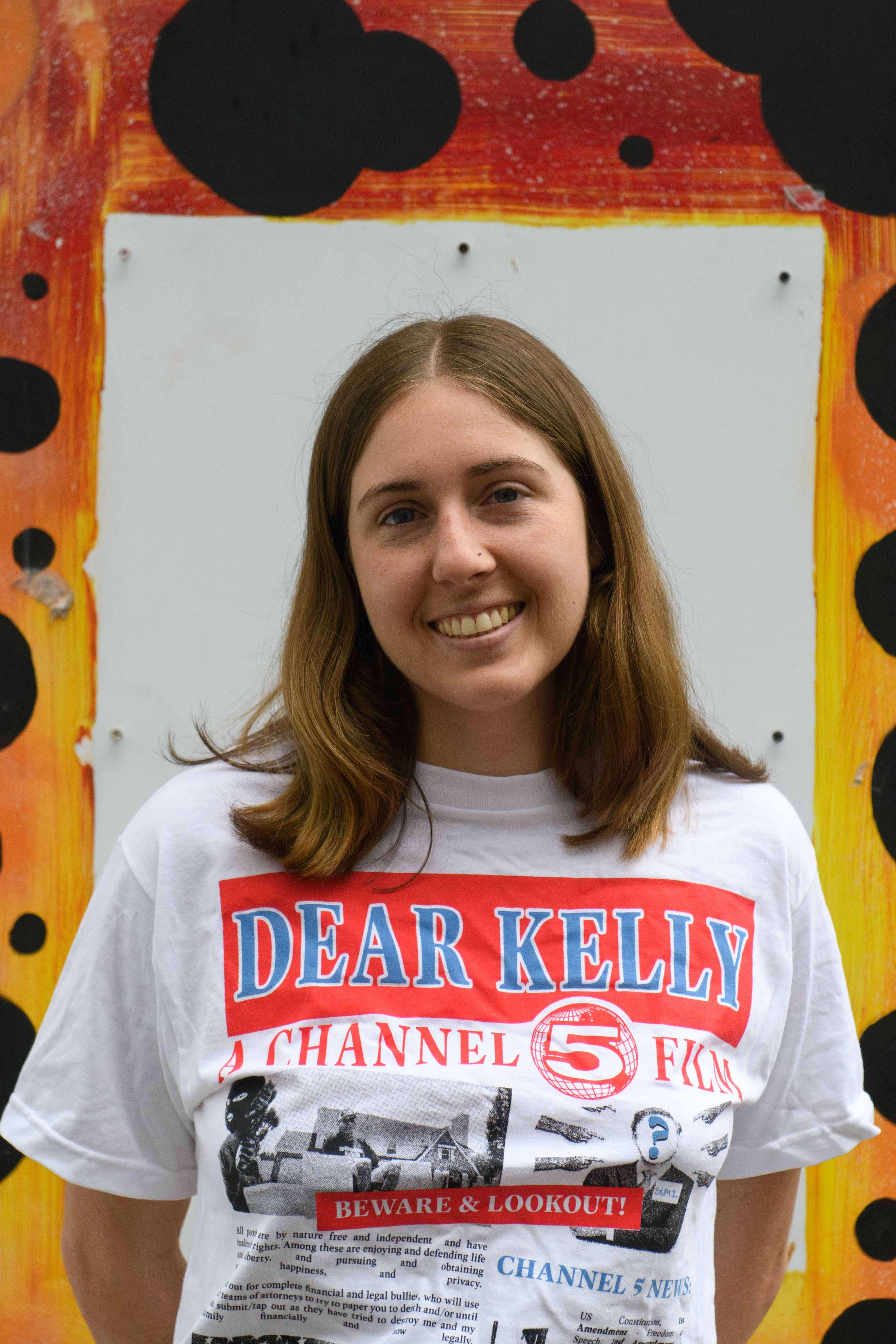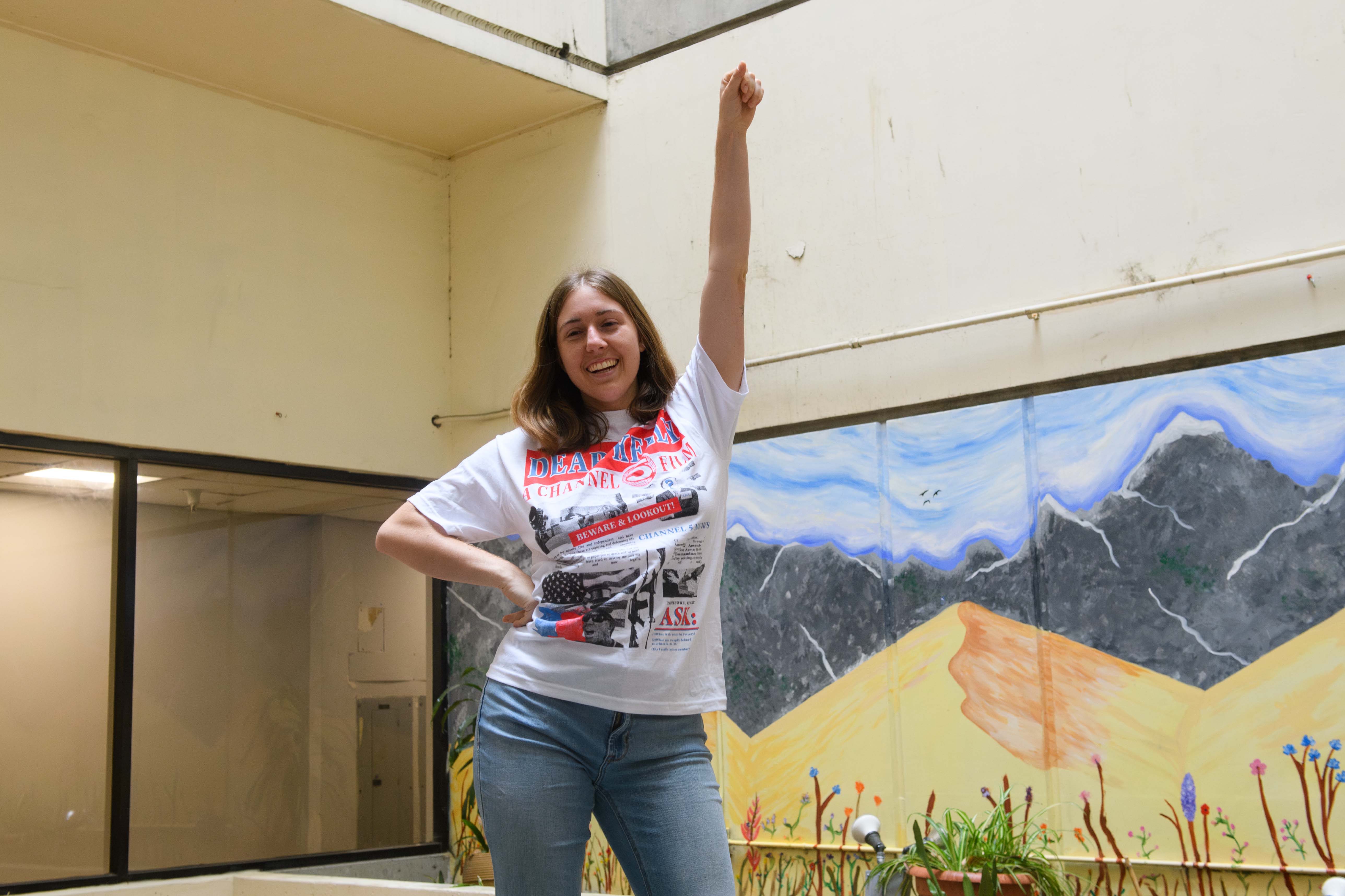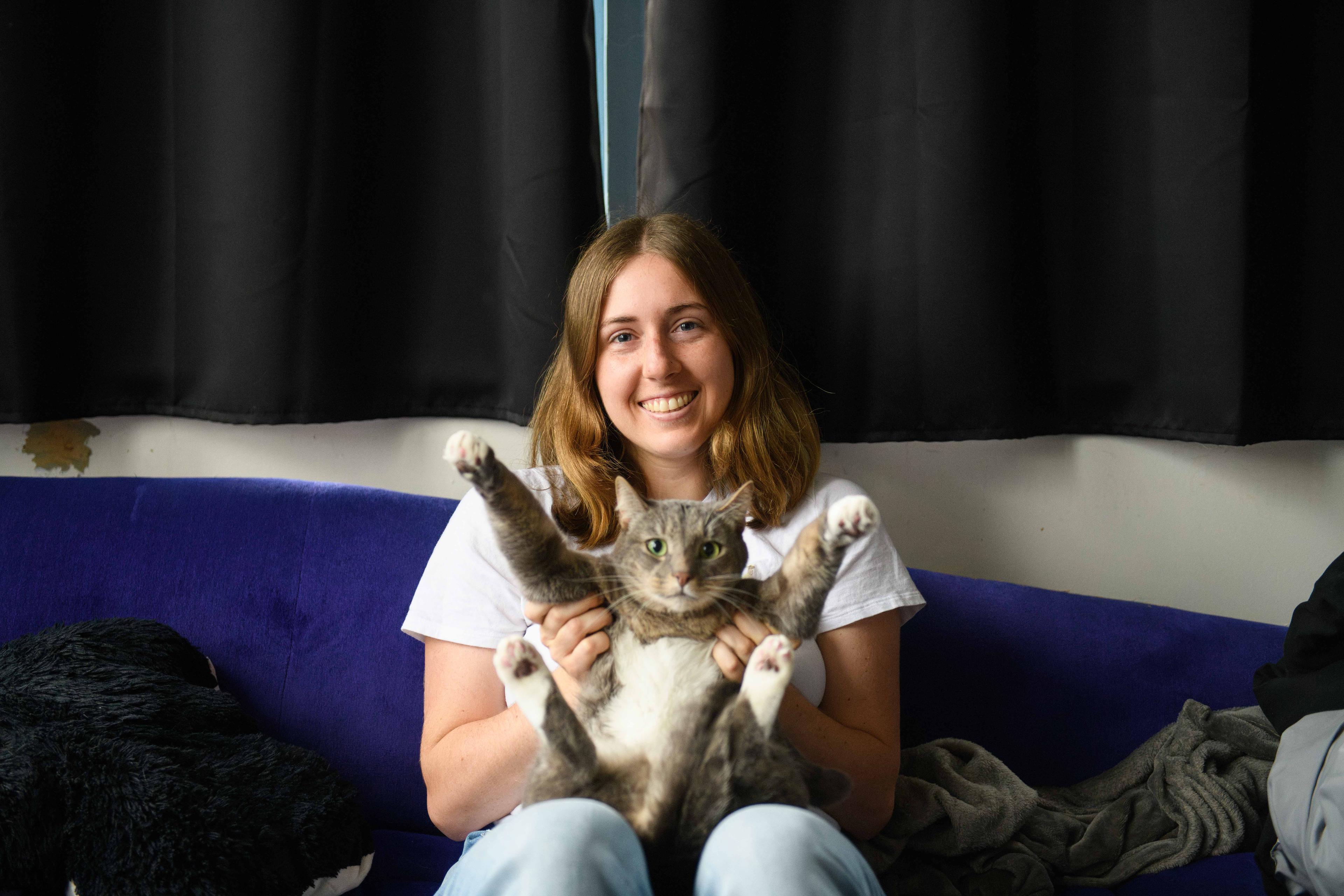Kaylee Johnson explores dynamic with radicalized right-wing father in ‘Dear Kelly’
Kaylee Johnson holds her cat Poppy in a room at the University Cooperative Housing Association. The 2023 sociology graduate’s father – Kelly Johnson – was the subject of Andrew Callaghan’s new documentary “Dear Kelly,” which follows Kelly’s journey to far-right radicalization. (Max Zhang/Daily Bruin)
By Amanda Velasco
March 13, 2025 12:21 a.m.
Kaylee Johnson is open about her father’s far-right radicalization.
Johnson was featured in the documentary “Dear Kelly,” released Jan. 15 and directed by Andrew Callaghan – an independent journalist and creator of “Channel 5” on YouTube. The film follows a character profile of Johnson’s father, who calls himself Kelly J. Patriot, and his path to political extremism after his home’s foreclosure following the 2008 financial crisis.
Kelly’s worldview became centered around conspiracy theories following his family’s eviction from their home, eventually leading to his participation in the attack on the United States Capitol on Jan. 6, 2021, Kaylee said.

Kaylee, a 2023 UCLA sociology graduate and UCLA Health researcher, said she was open to being vulnerable about her relationship with her father throughout the film’s four years of production because she felt her family’s story was important to tell. The documentary includes family intervention and delves into sensitive details of her familial trauma from childhood to adulthood.
“This is not the man that I grew up with,” she said. “That’s why I do say I am mourning the father that I had, even though he’s still alive.”
Callaghan said the documentary aims to reveal the ties between deep personal loss, financial trauma and wide-scale radicalization, and he added that he wanted to create more understanding toward radicalized people.
Kelly was disbarred as a bankruptcy attorney and separated from his wife around the same time as his home’s foreclosure, Kaylee said. His ex-wife then took custody of Kaylee and her two siblings, Kyle and Sydney, Callaghan said in the film.
“He (Kelly) asked for compassion, and he didn’t receive it, so he looks at the world as inherently cursed,” Callaghan said. “But the real machine to blame is the systems of capitalism that create the ability for someone to go from a perfect life to being homeless in a week.”
After meeting Kelly at a 2021 “White Lives Matter” rally in Huntington Beach, California, Callaghan said he discovered Kelly’s radical views were rooted in deep resentment toward Bill Joiner, the private lender who ordered his home’s foreclosure. Although Joiner and Kelly never met, he alleged that Joiner “stole his home.”
The Johnsons’ home was one of more than six million houses that foreclosed as a result of the Great Recession.
Throughout the film, Callaghan said he tried to help Kelly detach from his resentments toward Joiner by finding the private lender in person and engaging in mediation. However, they were not able to meet Joiner in the film – and Callaghan said Joiner filed a lawsuit against him and his team because he believes they are validating Kelly’s grievances.
Callaghan said the legal fees from the lawsuit will likely cost all of his earnings from the film’s independent distribution.
Kaylee said before her childhood home’s foreclosure, her father cared for dozens of pets including rabbits, pigs, dogs and cats in their Laguna Hills, California, home – adding that he would often take his kids to McDonald’s and spend time by their pool.
However, Kaylee said their family’s dynamic changed after they were evicted and Kelly was radicalized, as he became an absent father. She added that she believes her father’s extremism came from fears for the country’s future and safety.
“QAnon genuinely has taken over every aspect of my dad’s life, and it’s become his entire community,” she said.
QAnon is a far-right conspiracy movement based on the belief that President Donald Trump is waging a secret campaign against an underground, anti-Trump network tied to satanism and child trafficking – most of whom are Democrats and Hollywood elites. QAnon supporters were among the thousands of people who stormed the U.S. Capitol in the Jan. 6 insurrection, according to the Associated Press.
Following his radicalization, Kelly skipped a treatment appointment for his daughter Sydney’s eating disorder and went to an event hosted by Charlie Kirk at UCLA in 2024, which was showcased in the film, Kaylee said. Kyle Johnson, Kaylee’s brother, also said his father’s attachment to conspiracy theories made navigating middle school and high school more challenging.
Kaylee, who came out as gay to her dad, said her father also expressed in the film that he would not go to her wedding if she married a woman. However, she said she is proud to contribute to the representation of queer stories and encourages others to stay true to themselves as long as it is safe to do so.

Kaylee said the hardest scene for her and Kyle to film was when Heather Hayes – a professional interventionist – facilitated an intervention for Kelly. In the scene, Kaylee, Kyle and Sydney took turns reading written letters to Kelly, in which they shared how they want their father back.
Afterward, Kelly then agreed to participate in a 28-day Pennsylvania rehabilitation program for addiction, trauma and psychosis, Kaylee added.
However, she said Kelly then used his marijuana addiction as an explanation for his fixation on Joiner and absence as a parent – ultimately not significantly improving after the rehabilitation. Kyle added that his father’s conspiracy-centered worldview did not change after the documentary’s release.
“We told him that we feel neglected and that he doesn’t spend time with his children and that he doesn’t put any effort into his relationship with us,” Kaylee said. “That’s all we can do.”
Despite Kelly’s radical views, the Johnsons have not given up on supporting him, Kyle said. However, they have learned that people will only change if they want to, Kaylee added.
“The timeline of the film isn’t the timeline of Kelly’s life,” Callaghan said. “Just because it didn’t necessarily end the same way that I wanted it to – which is Kelly making a full cognitive recovery – it doesn’t mean that I’m giving up on being in there for him, and that’s kind of one of the messages of the film too.”
Kyle added that his experiences with a radicalized family member serve as a motivation to one day be a better parent.
Kaylee, who has lived at the University Cooperative Housing Association for four years and is its membership committee chair, hosted a Jan. 24 “Dear Kelly” screening there, with about 40 people attending, she said.
Kaylee said although audience members cried and laughed at the film’s story, people were visibly frustrated at a scene where Kirk told Kelly to pray for his daughter because of her progressive views. She added that her friends’ concerned reactions at the screening affirmed she has people there for her.
Remi Gallegos, a UCLA graduate and friend of Kaylee’s who attended the co-op screening, said he better understood Kelly’s pipeline to radicalization, adding that he believes anyone can be radicalized under certain circumstances.
Kaylee has always been the glue of the Johnson family, said Madeline Albright, a UCLA graduate who met Kaylee at the co-op in 2020. Albright attended a screening in San Francisco with Kaylee as part of Callaghan’s national tour for the film.
“I like the way that he framed the movie of just having a human standpoint – rather than anything else,” Albright said. “Just prioritizing that we’re all people, and we’re just trying our best, because I think we’re going to just continue to get more and more divided as this presidency goes on, and that’s what’s going to really distract us.”
Callaghan said Kelly attended a few screenings of the tour and disagreed with some scenes but mostly reacted positively because he was simply excited to be a part of the film. However, Kaylee added that although she and her siblings are still in touch with their father, their relationship is still “surface-level,” as he has yet to become more active in their lives.
“At the end of the day, family is so, so, so important. Love is so, so, so important,” she said. “If more people knew that, then we wouldn’t be in these situations.”
